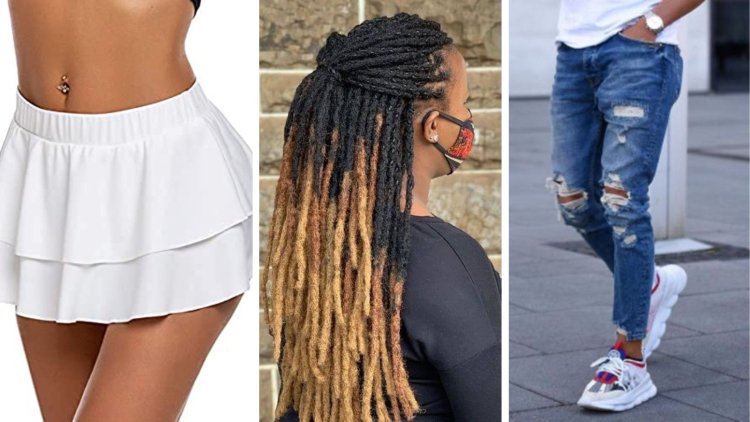Inside St Paul's University's 17 Little-Known Dress Code Rules [LIST]
The university has established a standard of dressing across its student body in line with its ambition to prepare its students and graduates for the corporate job industry.
![Inside St Paul's University's 17 Little-Known Dress Code Rules [LIST]](https://viraltea.co.ke/uploads/images/2023/01/image_750x_63ce674dbf502.jpg)
The policy on dress code across Kenyan universities has seen two of them review their regulations on the same in 2023 and the policy itself sparking debate across the country, especially after varsity memos of the same have been shared on social media.
So far, the Kenya Methodist University (KeMU) and the University of Eldoret have reviewed their dress codes in 2023 and among the items banned within the male and female student community include micro/mini-skirts; skin-tight trousers, sagging trousers; clothes revealing chests, Rasta/dreadlocks (Wear properly groomed hair) and plaited hair.
Viral Tea is in receipt of a dress code policy by St Paul's University, a Christian ecumenical institution with students and staff from all over the world. Its main campus is located in Limuru, Kiambu County with other campuses in Nairobi, Nakuru and Machakos.
The university has established a standard of dressing across its student body in line with its ambition to prepare its students and graduates for the corporate job industry.

"The dress code is informed by our identity as a Christian University and the fact that learning to use socially acceptable manners and choosing appropriate attire are critical factors in the whole educational process as expressed in our mission and vision.
"Continuous use of appropriate dress and manners demonstrates that our students meet the high standard expected of our graduates in their social, cultural, physical, moral and educational life and this applies when on and off-campus," reads a notice of the dress code policy in part.
To uphold the appropriate fashion standards expected of its students and graduates of the university, the institution outlawed 17 styles which its students shall not wear. Simply put, the student shall not:
- Wear clothes that fit too tight, mini shorts, spaghetti strap dresses or any clothing that fits above the knee or that exposes cleavage, back, chest, and stomach.
- Dress in a way that covers his or her face or hides his/her identity.
- Wear shades in classrooms, gates, halls, chapel and offices.
- Wear clothes that have derogatory, offensive lewd messages in words or pictures 5. Wear sagging trousers, shorts or any clothing that reveals undergarments or private parts.
- Wear dirty and torn or ragged jeans.
- Wear clothing or jewellery with a display of words or symbols associated with alcohol, illegal drugs or tobacco.
- Have hairstyles of unnatural colours for both males and females, if must use colour, it should be black, shades of dark brown or grey.
- Keep dirty and unkempt hair.
- Must not cycle in the University compound without a helmet and only cycle in designated areas (the road between the gate and the student centre).
- Wear studs and rings (except for the finger) on any part of the body except for women.
- Wear flip flops and slippers, crocs, or any noisy and distracting shoes, in classrooms, offices, chapel and in formal University functions.
- Have tattoos that are not completely covered.
- Wear strong perfumes and colognes.
Male students shall not;
- Put on caps, hats, head wraps, bandanas, hoods or other inappropriate head covering in class, chapel or offices unless for a special activity where authorized
- Have dreadlocks or plaited hair
- Have studs or rings (except for the finger) on any part of the body.
Meanwhile, university students have come out to strongly oppose the directive which many fear could spread to more universities across the country, even those long considered to be liberal in nature.
Kenya University Student Organization (KUSO) President Anthony Manyara, in a statement dated Sunday, January 22, accused KeMU, the University of Eldoret and St Paul's University of threatening their students with consequences for failing to adhere to the dress code policies as depicted in their memos.
"It should be noted that no approved law, bylaw, policy or set of regulations have ever been passed universally, and approved by any Committee on Education of the bicameral house, of Kenya.
"Any changes in attires or dressing in any institution in Kenya must happen after following due process of constitutional provisions on public participation (in this regard, students via their reps, amongst other key stakeholders) as clearly spelt out in articles 69 (1) (d), 118, 174, 184, 196, 201 (a), 221 (5), and 232 (1) (d) among others," he stated in part.
Manyara further called upon all university students to shun any dress code policies imposed on them by their respective institutions, terming them oppressive and retrogressive to student life on campus.
He vowed consequences on any institution found to be targeting students or profiling them for dressing in a manner that its administration finds unfit for the conduct of the university.

KUSO president Anthony Manyara. /THE STAR
"In light of this, KUSO hereby directs all students from all institutions of higher learning to disregard the said directives and treat them as oppressive, retrogressive, thalakwensic innuendos, which they are. So long as a comrade doesn’t walk naked, all is well on campus.
"Any student targeted or ethically profiled for dressing in a way, any institution administration deems inappropriate, will automatically call for a collective solidarity of comrades. The repercussions are far way better imagined than remotely experienced," Manyara added.

 admin
admin 




